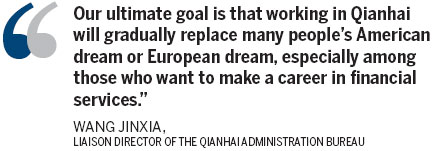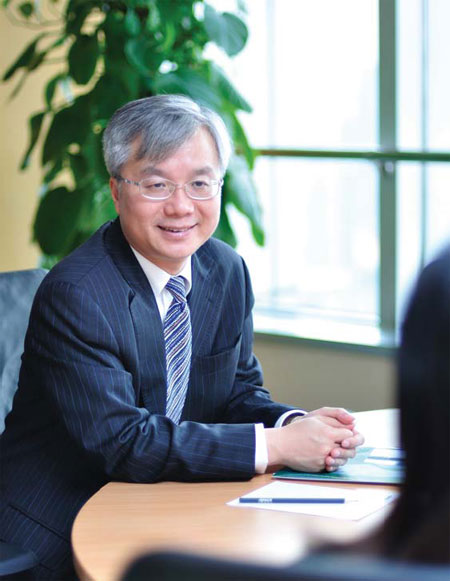Bringing home the talent
Updated: 2012-09-07 10:27
By Yan Yiqi (China Daily)
|
|||||||||||
|
Peter Kung, senior partner for Southern China at KPMG China, suggests that Qianhai open the gate wider for Hong Kong professionals. Provided to China Daily |

Qianhai sweetens pitch to attract more financial professionals
Apart from innovative policies to develop modern service industries, the Qianhai Shenzhen-Hong Kong Modern Service Industry Cooperation Zone has also come out with preferential policies to attract high-level talent.
Under the policies, professionals from Hong Kong will be allowed to work in Qianhai, while those from Hong Kong who are qualified as a certified public accountant in China will be allowed to become partners of mainland accounting firms.
Eligible senior talent will also be exempt from paying their portion of the individual income tax that goes to the local government. Related medical, education, housing and telecom services have also been spruced up to help attract more talent.
"Presently, Qianhai has the highest level of preferential policies for senior talents," says Wang Jinxia, liaison director of the Qianhai Administration Bureau. "The administration bureau itself will not conduct road shows and exhibitions to attract talents. Our idea is to let companies in Qianhai attract talent automatically."
Wang is confident that the business and working environment and preferential policies are attractive enough for Hong Kong and overseas talent to work there.
"Our ultimate goal is that working in Qianhai will gradually replace many people's American dream or European dream, especially among those who want to make a career in financial services," he says.
By 2020, Qianhai plans to accumulate 10,000 senior managers in financial industries, 150,000 financial professionals and 100,000 to 120,000 professionals in other modern service industries, according to Wang.
However, the reality might not be as promising as the Qianhai authorities have envisaged.
"The policy that allows Hong Kong professionals with Chinese CPAs to become partners in mainland accounting firms can be useful to a very limited number of people," says Peter Kung, senior partner for Southern China at KPMG China.
"Fewer than 150 Hong Kong professionals have passed China CPA examination. Many of them are not practicing accountants."
Kung says the current policy's preferential scale is too limited and suggests that Qianhai open a wider gate for Hong Kong professionals.
By June 14, 2012, only 36 practicing members of Hong Kong Institute of Certified Public Accountants had obtained certification, and only nine of them practice in both regions.
"The current thought of the Qianhai authorities is that Hong Kong residents with only Hong Kong CPA qualification are not allowed to be partners in accounting firms in Qianhai," says Kung.
"It would be more beneficial to both Hong Kong and Qianhai if Hong Kong CPAs are allowed to establish partnership with mainland CPAs in Qianhai. These partnerships should be allowed to provide services to Hong Kong companies operating in this district.
"It is also quite possible that many of these Hong Kong companies are existing clients of the Hong Kong CPAs. Serving theses clients with mainland CPAs can potentially benefit both."
The taxation policy may also be not as attractive to overseas talent as it sounds.
According to the current thought, the Qianhai authorities will refund a portion of the individual income tax that it has collected from overseas talent.
The current personal income taxation policy regulates that 60 percent of the tax will go to central government, and 40 percent will go to local government. This means, under the favorable policies, 40 percent of eligible professionals' individual income tax will be waived.
"For those with annual salaries of around 1 million yuan ($157,000, 125,000 euros), the effective tax rate is about 30 percent. After the 40 percent relief, the effective tax will be reduced to about 18 percent," Wang says.
"Compared with Hong Kong's 15 percent tax rate, the reduced tax rate of 18 percent is competitive. However, for senior executives who earn, say, 10 million yuan a year, their effective tax rate after the relief will still exceed 25 percent, which is more than 10 percent higher than the Hong Kong tax rate.
"Qianhai authorities should consider giving more preferential treatments to attract these special talents to come to work in Qianhai."
According to a survey conducted by human resources consulting company Mercer, among the 158 surveyed US and Canadian companies, 52 percent regarded China as the most challenging emerging market for human resource management. Lack of professionals and experienced managers, regional differences and complicated taxation are their major concerns.
yanyiqi@chinadaily.com.cn
(China Daily 09/07/2012 page16)
Today's Top News
Rescuers race against time for quake victims
Telecom workers restore links
Coal mine blast kills 18 in Jilin
Intl scholarship puts China on the map
More bird flu patients discharged
Gold loses sheen, but still a safe bet
US 'turns blind eye to human rights'
Telecom workers restore links
Hot Topics
Lunar probe , China growth forecasts, Emission rules get tougher, China seen through 'colored lens', International board,
Editor's Picks

|

|

|

|

|

|






